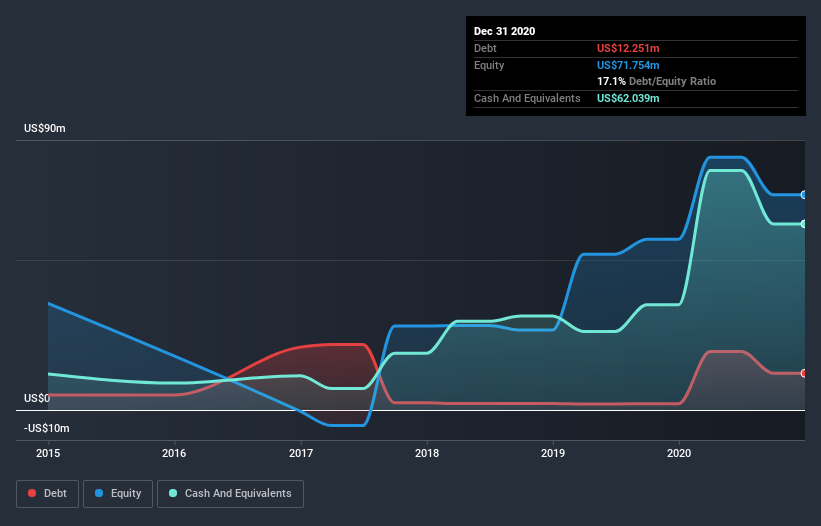- United Kingdom
- /
- Diversified Financial
- /
- AIM:BOKU
Here's Why Boku (LON:BOKU) Can Manage Its Debt Responsibly
David Iben put it well when he said, 'Volatility is not a risk we care about. What we care about is avoiding the permanent loss of capital.' When we think about how risky a company is, we always like to look at its use of debt, since debt overload can lead to ruin. We note that Boku, Inc. (LON:BOKU) does have debt on its balance sheet. But the real question is whether this debt is making the company risky.
Why Does Debt Bring Risk?
Debt is a tool to help businesses grow, but if a business is incapable of paying off its lenders, then it exists at their mercy. Ultimately, if the company can't fulfill its legal obligations to repay debt, shareholders could walk away with nothing. However, a more usual (but still expensive) situation is where a company must dilute shareholders at a cheap share price simply to get debt under control. Of course, the upside of debt is that it often represents cheap capital, especially when it replaces dilution in a company with the ability to reinvest at high rates of return. When we think about a company's use of debt, we first look at cash and debt together.
Check out our latest analysis for Boku
What Is Boku's Net Debt?
The image below, which you can click on for greater detail, shows that at December 2020 Boku had debt of US$12.3m, up from US$2.10m in one year. However, its balance sheet shows it holds US$62.0m in cash, so it actually has US$49.8m net cash.

How Strong Is Boku's Balance Sheet?
Zooming in on the latest balance sheet data, we can see that Boku had liabilities of US$139.7m due within 12 months and liabilities of US$13.6m due beyond that. Offsetting this, it had US$62.0m in cash and US$87.9m in receivables that were due within 12 months. So its liabilities total US$3.37m more than the combination of its cash and short-term receivables.
This state of affairs indicates that Boku's balance sheet looks quite solid, as its total liabilities are just about equal to its liquid assets. So while it's hard to imagine that the US$728.8m company is struggling for cash, we still think it's worth monitoring its balance sheet. Despite its noteworthy liabilities, Boku boasts net cash, so it's fair to say it does not have a heavy debt load!
Although Boku made a loss at the EBIT level, last year, it was also good to see that it generated US$4.5m in EBIT over the last twelve months. The balance sheet is clearly the area to focus on when you are analysing debt. But it is future earnings, more than anything, that will determine Boku's ability to maintain a healthy balance sheet going forward. So if you want to see what the professionals think, you might find this free report on analyst profit forecasts to be interesting.
Finally, a company can only pay off debt with cold hard cash, not accounting profits. Boku may have net cash on the balance sheet, but it is still interesting to look at how well the business converts its earnings before interest and tax (EBIT) to free cash flow, because that will influence both its need for, and its capacity to manage debt. Happily for any shareholders, Boku actually produced more free cash flow than EBIT over the last year. That sort of strong cash conversion gets us as excited as the crowd when the beat drops at a Daft Punk concert.
Summing up
While it is always sensible to look at a company's total liabilities, it is very reassuring that Boku has US$49.8m in net cash. The cherry on top was that in converted 622% of that EBIT to free cash flow, bringing in US$28m. So we don't think Boku's use of debt is risky. The balance sheet is clearly the area to focus on when you are analysing debt. But ultimately, every company can contain risks that exist outside of the balance sheet. Be aware that Boku is showing 3 warning signs in our investment analysis , you should know about...
If you're interested in investing in businesses that can grow profits without the burden of debt, then check out this free list of growing businesses that have net cash on the balance sheet.
When trading Boku or any other investment, use the platform considered by many to be the Professional's Gateway to the Worlds Market, Interactive Brokers. You get the lowest-cost* trading on stocks, options, futures, forex, bonds and funds worldwide from a single integrated account. Promoted
Valuation is complex, but we're here to simplify it.
Discover if Boku might be undervalued or overvalued with our detailed analysis, featuring fair value estimates, potential risks, dividends, insider trades, and its financial condition.
Access Free AnalysisThis article by Simply Wall St is general in nature. It does not constitute a recommendation to buy or sell any stock, and does not take account of your objectives, or your financial situation. We aim to bring you long-term focused analysis driven by fundamental data. Note that our analysis may not factor in the latest price-sensitive company announcements or qualitative material. Simply Wall St has no position in any stocks mentioned.
*Interactive Brokers Rated Lowest Cost Broker by StockBrokers.com Annual Online Review 2020
Have feedback on this article? Concerned about the content? Get in touch with us directly. Alternatively, email editorial-team (at) simplywallst.com.
About AIM:BOKU
Boku
Provides local payment solutions for merchants in the Americas, the Asia Pacific, Europe, the Middle East, and Africa.
Flawless balance sheet with solid track record.
Similar Companies
Market Insights
Community Narratives



